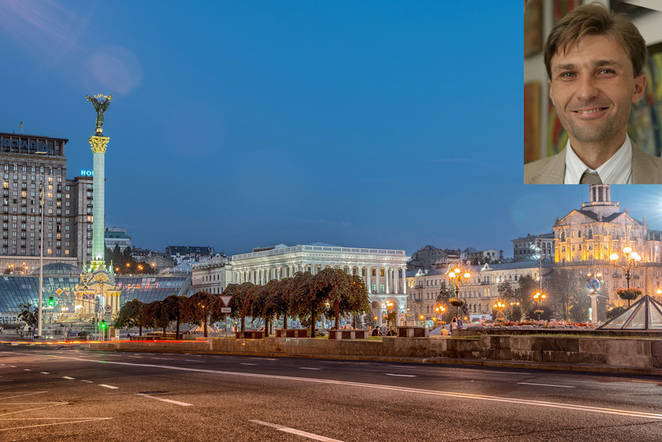In November 2013, the political situation in Ukraine took a turn to the worst ; images of violence and war went viral on news networks, social media and shocked the world.
Our colleagues Christian Bock, former President of Eurojuris Germany and Hans Jonkhout, former President of Eurojuris International, had decided to visit our colleagues Vitaly Tytych and Oleksyi Bezhevets in Kiev not only to show their support in those difficult times, but also enquire on the abuses of justice and the deprivation of basic rights Ukrainian lawyers had to face in order to preserve secrecy and confidentiality in their work. The case of Viktor Smalyy, a lawyer who represented an independent organisation of lawyers and journalist, was arrested, beaten, tortured and imprisoned for basically doing his job, appalled them and shocked the international community. You can find the original article here.
We decided to contact Vitaly Tytych to get an insight on the current situation in Ukraine, here’s how he depicts reality in his country post Revolution, and it’s far from being reassuring…
“The ongoing armed conflict in Eastern Ukraine, not to mention the occupation of Crimea, are far from the much-desired finish.
Notwithstanding the formal ceasefire declared under the Minsk Agreements, the Ukrainian is struggling through daily shelling. We do not answer back as we may not do so due to the above-mentioned Minsk Agreements. Almost every day brings sad news about the killed and wounded.
Last month, a Ukrainian-French singer, a soloist of the Paris Opera, who had volunteered to join the army in Eastern Ukraine was shot dead by a sniper.
All of the above is an evidence of the lasting Russian aggression and the plan of Kremlin to continue destabilising the situation in Ukraine by financially supporting separatists and providing their own army and mercenaries to Eastern Ukraine. In a way, the current situation is a continuation of Maidan with its externally funded terrorist acts and large-scale brainwashing media campaigns.
The listed factors supported by a lasting dysfunction of state authorities, esp. law enforcement agencies, ensure the slow recovery of the country. Although some progress as the introduction of online public procurement and gradual stabilization of the national currency has been made, it is still rather slow and could have been more effective should the political will be there. The investigation of Euromaidan crimes is a good example.
The progress is very modest. And whereas the investigation says it is due to the inactivity of the courts that are slow in adjudicating the cases, the judges say that the materials of pre-trial investigation and prosecution are poorly drafted.
As regards business in Ukraine, it has, surely, slowed down in most sectors, except for IT, which is rapidly growing. Our team has not had profit-driven commercial practice for quite a while. We have been acting as the pro bono representatives of Euromaidan victims and their families since the Revolution.
Last year, we officially registered an association of barristers called the Advocacy Advisory Panel. In such a way, we formalized our activities and became more known to state authorities and the public under our joint name. We are representing the interests of student protestors who were forcibly dispersed, persecuted journalists and those protestors who were killed on 18-20th February 2014.
Previously, we just monitored the investigation and conducted our own independent investigation. However, as the court hearings started, the process has intensified and there is no time for private legal practice at all now.
The Advocacy Advisory Panel team is also cooperating with the International Criminal Court (ICC). As you probably know, Ukraine submitted two declarations recognizing the jurisdiction of the ICC with respect to Euromaidan, the occupation of Crimea and armed conflict in Eastern Ukraine. The Office of the Prosecutor of the ICC published its preliminary conclusions later last year. With respect to Euromaidan, the Prosecutor seems to lack evidence as regards the systematic or widespread nature of crimes. We are currently working on the collection and formalization of evidence that might be relevant for the ICC Prosecutor to change her opinion in this regard.”


